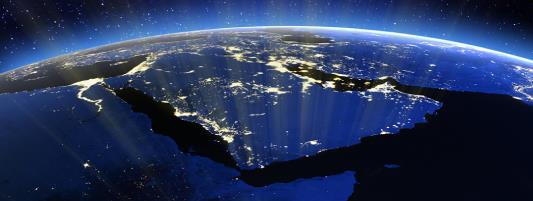
Middle East and North Africa
Pan-Arab Clean Energy Initiative
Overview
The business case for renewables is evident from renewable energy competing directly with conventional energy technologies. By backing the global energy transition, the region has aligned itself with the objectives of the Paris Agreement, that is to limit the global average temperature rise to well below 1.5°C. While recent progress on renewables represents a significant increase, the present level of renewable energy capacity is far below the levels planned by the region’s countries. More rapid progress is expected in the future.
Analysis for IRENA’s World Energy Transitions Outlook (WETO) reveals that the region could obtain almost 26% of its total primary energy supply from renewables by 2050, while the renewable share could reach 53% in the power sector. This would result in an emissions reduction equivalent to 1.1 Gt CO2/yr. Renewables sector jobs reach 2 million in the region under the Transforming Energy Scenario, up from 542 000 in 2017.
Driven by the climate emergency and countries’ commitments to net zero, IRENA estimates that hydrogen could meet up to 12% of global energy demand by 2050. Accordingly, the market for green hydrogen in the Middle East is moving from what seemed like a future hypothetical to a promising reality, with several plans at the domestic level to meet demand from export markets and hard-to-abate sectors.
IRENA work in the region
Key data
Past Events
-
31 August 2022-1 September 2022 Bali, Indonesia
G20 Energy Transitions Investment Forum
-
21-22 March 2022 Virtual
Consultative Workshop on IRENA North African Power Pool Modelling
-
15-16 March 2021 Khartoum, Sudan
First Sudan












